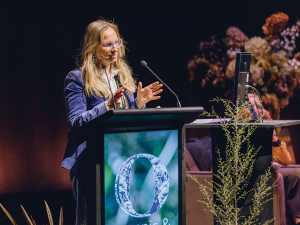OPINION: At the recent Organic and Biodynamic Winegrowing Conference, the Porto Protocol’s Marta Mendonça said, “Grapes are not the thirstiest of crops, but they are a luxury crop”.
It made me think of another comment I’d recently heard, that “we don’t need wine”.
So, do we need wine? Strictly speaking, no. Wine is not essential to sustain life like air, water, food or shelter. Indeed, as we are increasingly reminded, as an alcoholic substance it carries inherent health risks. But when we ask whether wine is necessary, we inevitably step beyond biology and into the realm of meaning. Wine has been with us for millennia. It may not be as old as humanity, but it has arguably developed alongside what we might now call civilisation. Its value has been not only in its humblest forms – as something that was once microbially safer to drink than water – but also in sacred and symbolic roles. In this broader context, it becomes something more than just a luxury.
Of course, from a strict material or economic standpoint, wine is undeniably discretionary. After all, likely billions of people the world over live full, meaningful lives without it. Calling wine a ‘need’ might therefore seem culturally privileged or even indulgent. In the current world’s sadly too-numerous disaster zones, wine will rightfully be eclipsed by genuine essentials. Yet, imagine a world without wine. No Greek or Roman gods of the vine, no vineyards draped over hills, no clinking of glasses, popping of corks (ahem), or shared rituals and conversations over bottles that stretch into the wee hours. We start to lose more than just a drink, we lose threads of shared human culture, too.
Philosophers, artists and composers have all used wine to explore life’s meaning. Epicurious was a fan, of course, but Aristotle’s eudaimonia (that contented state of feeling happy, healthy and prosperous) is familiar to many wine drinkers. Even the Stoics, so sceptical of indulgence, acknowledged that certain pleasures can still be embraced with suitable wisdom. Anyone who has ever seen Caravaggio’s Bacchus or heard Brindisi from Verdi’s La Traviata understands that wine is not just something merely consumed, it can be experienced. Wine can as such be considered a portal.
Wine is also a vehicle for practical tradition. Through viticulture, humans have come to understand place, via soil, season and what it means to be a steward of the land. While crops were first grown purely for sustenance, in time, some – like vines – were also valued for their beauty and connection to nature. A world without wine would strip away these further threads of knowledge and cultural continuity.
So, is wine a necessity? Not in the way air or water is. Is it a luxury? Almost certainly. But it’s also something humanity would surely be much poorer without. Though surprisingly, it is something about which I find myself quite agnostic. A fellow MW and I were once asked, “If you could only have one – wine or books – which would it be?” She answered “wine” and I simultaneously answered “books”, at which point we burst out laughing. I didn’t hesitate then, but I also sincerely hope I never have to choose.
Read More:





